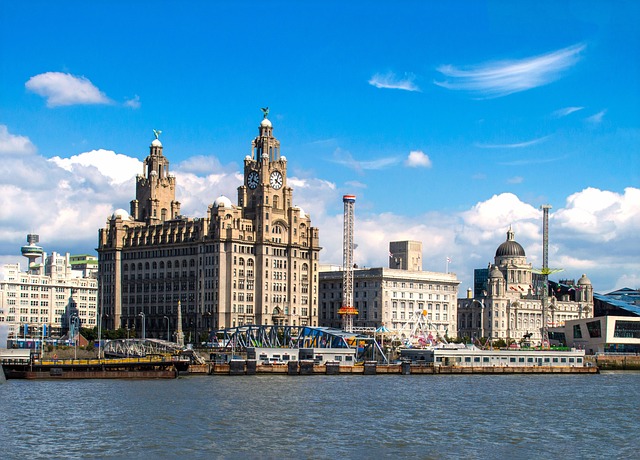
Andrew, by coincidence, had just returned from a nostalgic weekend in Liverpool; while there, among other things, he’d had the chance to sit on Liverpoool footballer Mo Salah’s changing room chair! A fact that excited the Liverpool fan!
“So what’s so special about Liverpool?” asked Andrew at the start of his talk – before answering himself: “Well, I love it!”
Andrew was actually born in Liverpool, living there for three years until his family moved to the Wirral. But when he was 18 he managed to get a job with Liverpool City Council, and they eventually paid for his degree. Andrew later spent 5 years at the renowned Liverpool School of Tropical Medicine.
During Andrew’s introduction we learned all sorts facts and figures about Liverpool. For instance, Liverpool has 28 miles of docks – each dock capable of taking 4 – 6 ships; the ships would bring mariners from all parts of the world into the docklands. We also heard about the famous nude statue of a sailor (nicknamed Dickie Lewis) looking out to sea; Andrew recounted an anecdote that we cannot share here!
Moving on to the main topic of his talk, public health, we learnt that historically, Liverpool was no stranger to the so-called “monster miasma” – referring to the obsolete theory that diseases such as cholera were caused by miasma or “bad air”. At times smallpox, typhoid, cholera and black death (the Plague) were all to be found there.
Public health was therefore very important to Liverpool – and vice versa. Infant mortality at the time of the Chadwick Report (published in 1843) was greater than 50%, so although women had many children, they often died. One cause of this was very poor housing. Following the Irish Potato Famine in the mid-1800s, many Irish came to Liverpool and lived in great poverty in such housing.
The City Council had to do something to improve public health – but they were limited by what was permissible by law. In 1846 the Liverpool Sanitary Act came into being; it dealt with a number of public health issues and outlined several preventative measures. One, for example, was to prevent the building of “court houses” – a form of terraced housing with little ventilation and earth closets (the latter meant urine and faeces entered the ground and eventually the chalk strata…and through that went on to contaminate the local water supply).
From Andrew we learned about Doctor Duncan (there is well known pub named after him); Duncan became Liverpool’s first Medical Officer of Health, and Liverpool became the first place in the world to have such posts.
We also learned that in those days the City Council was responsible for utilities such as gas and water. It was a time of “night soil men” – men who dug out refuse and excrement-contaminated soil at night and replaced it with fresh soil. Andrew recounted a time when polio was so prevalent that the vaccine, added as drops to sugar lumps – would generate long queues of people wanting to receive it. We also learnt about the Clean Air Act introduced in Liverpool at a time when smog killed thousands of people, young and old, per day. Interestingly, Britain’s first smokeless zone was established in Liverpool (in 2004).
Talking of his own work, Andrew recounted how he spent many mornings approaching cows to secure a fresh sample of milk to test; he also spent time at abattoirs, looking at the quality of meat. “I once arrested the Empress of Britain,” he laughed. He was, of course, referring to the ship – arrested “for making black smoke in the Mersey!”
It was funny and fascinating and sometimes horrifying to hear Andrew’s collection of anecdotes about a topic one might think is very dull and technical.
Andrew’s own career eventually took him to Shropshire, then Cambridge and then Abergavveny, in Wales. He later worked in Shepway before, eventually, coming to work at Canterbury City Council.
Picture: Liverpool cityscape. Picture credit: Alan Wright from Pixabay .


